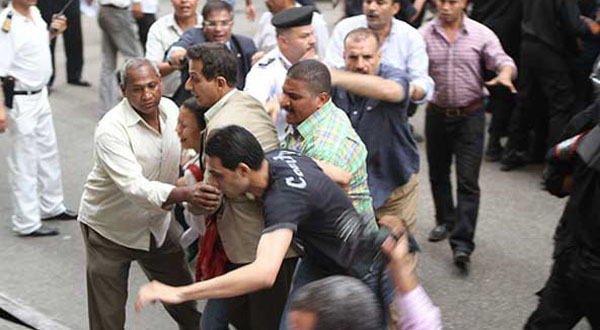 CAIRO: Security bodies again used force to break up a protest against police brutality on Sunday, for the second time in a week.
CAIRO: Security bodies again used force to break up a protest against police brutality on Sunday, for the second time in a week.
Protestors had planned to assemble in Cairo’s central Tahrir Square, but at 5 pm policemen were stationed at metro underground exits and plain-clothed policemen were moving on people in the Square.
Protestors instead assembled in the nearby Bab El-Louq Square where they held up placards calling for the resignation of the Minister of Interior and condemning torture. They then began marching.
Police initially seemed caught off-guard by the protestors, who were able to march for 15–20 minutes while chanting and handing out leaflets to passersby and to motorists, who were brought to a standstill by the roughly 100 demonstrators.
A handful of plain-clothed policemen accompanied the march, making only one attempt to interfere with it when a police officer tried to detain a protestor but was prevented from doing so by other demonstrators.
When demonstrators entered the main artery of Sherif Street they were met with riot police who quickly deployed and prevented them marching any further.
Plain-clothed officers then sprang into action, roughly bundling away protestors into side streets before they were placed in police trucks. Some demonstrators and members of the media were physically attacked by security bodies. A policeman assaulted one journalist, Philip Rizk, while he was filming the protest.
One of the protestors detained, activist Ashraf Omar, said that he was arrested and assaulted by around six or seven plain-clothed policemen.
“I was put in a police truck and eventually let out on the Cairo-Suez road with three other detainees,” Omar said.
Omar claimed that one protestor, Mohamed El-Masry, required four stitches in his head after being assaulted by police officers. The news, however, couldn’t be confirmed.
A total of 55 protestors were arrested. All were subsequently released by 9 pm the same evening.
Roughly 100 demonstrators moved to the Journalists’ Syndicate around 6:30 pm, leaving only after hearing the news that the detained protestors were released.
The protest had been called following the death of 28-year-old Khaled Saeid, who eyewitnesses say was beaten to death by two policemen on June 6 in Alexandria.
Images of Saeid’s badly disfigured face, taken after his death, have galvanized Egypt’s online community and sparked protests in both Cairo and Alexandria.
On Sunday June 14 protestors assembled in Cairo’s Lazoghly Square and were penned in for some four hours by riot police. Tens of protestors were arrested.
Omar predicted that more protests prompted by Saeid’s death would be held in the future.
“We have held two demonstrations in very difficult places within … [one] week, which I regard as a success. Saeid’s death was a spark which set off a wave of anger. We cannot stay silent.”



